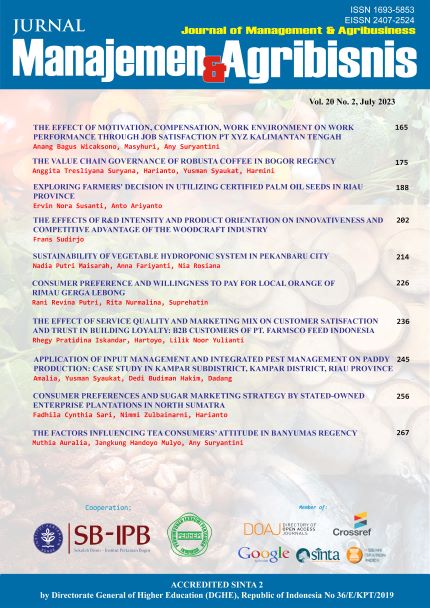Exploring Farmers' Decision in Utilizing Certified Palm Oil Seeds in Riau Province
Abstract
Riau Province is the largest center for smallholder palm oil plantations in Indonesia. The productivity of smallholder palm oil plantations is relatively lower compared to private and state plantations due to the low use of certified seeds. This study aims to describe the characteristics of smallholder oil palm businesses and analyze the decisions of smallholders in Riau Province regarding the use of certified oil palm seeds. This research utilized logistic regression analysis. The data used in this study were from the 2014 plantation business household survey conducted by BPS. The number of respondents was 1146 households. The results showed that the variable number of family members significantly negatively affected farmers' decisions to use certified oil seeds. On the other hand, the variables of age, education, capital, farmer groups, and partnership patterns positively influenced farmers' decisions to use certified oil seeds. Meanwhile, the variables of land area, type of land, assistance, and agricultural extension did not affect farmers' decisions to use certified palm oil seeds. Therefore, the decision of smallholders to use certified oil palm seeds is influenced by the number of dependents, age, education, capital, membership of farmer groups, and partnership patterns.
Keywords: certificated seed, farmer decision, logistic regression, palm oil, smallholder
Authors
Authors who publish with this journal agree to the following terms:
- Authors retain copyright and grant the journal right of first publication with the work simultaneously licensed under a Creative Commons Attribution License that allows others to share the work with an acknowledgement of the work's authorship and initial publication in this journal.
- Authors are able to enter into separate, additional contractual arrangements for the non-exclusive distribution of the journal's published version of the work (e.g., post it to an institutional repository or publish it in a book), with an acknowledgement of its initial publication in this journal.
- Authors are permitted and encouraged to post their work online (e.g., in institutional repositories or on their website) prior to and during the submission process, as it can lead to productive exchanges, as well as earlier and greater citation of published work (See The Effect of Open Access).

